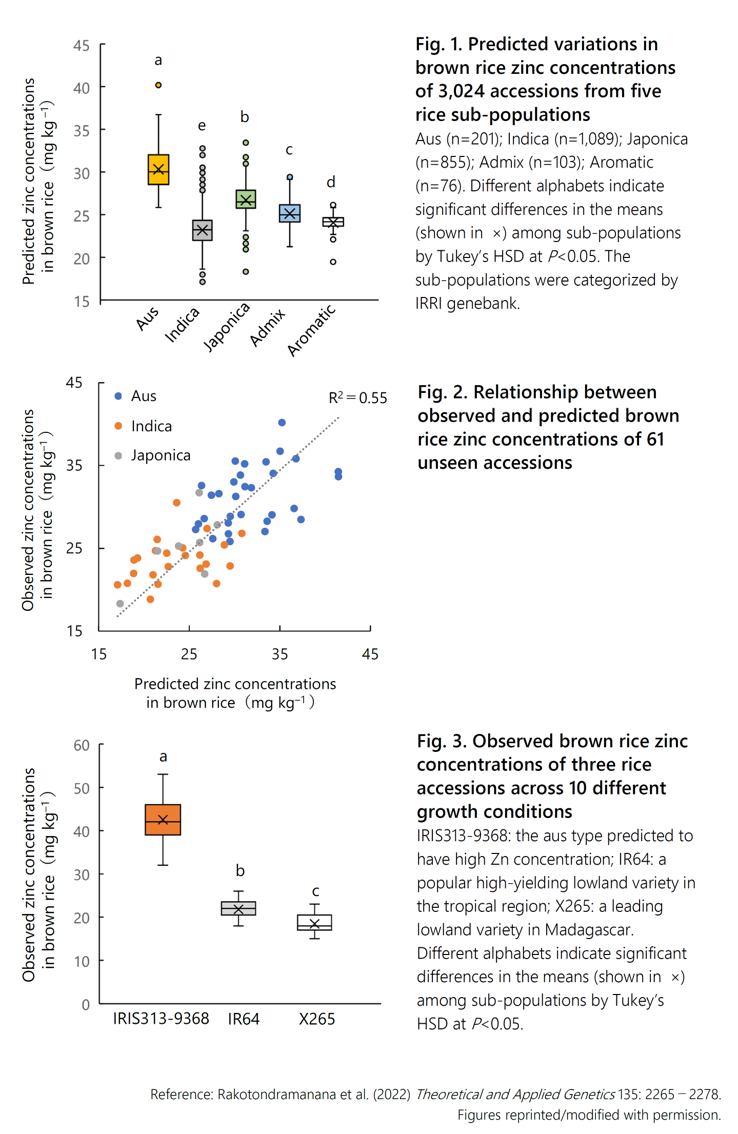Selection of a promising donor for developing zinc-biofortified rice based on genomic prediction model
Description
Increasing zinc (Zn) concentrations in edible parts of food crops, an approach termed Zn-biofortification, is a global breeding objective to alleviate micro-nutrient malnutrition. In particular, infants in countries like Madagascar are at risk of Zn deficiency because their dominant food source, rice, contains insufficient Zn. Biofortified rice varieties with increased grain Zn concentrations would offer a solution and our objective is to explore the genotypic variation present among rice gene bank accessions and verify their performance under farmers’ field conditions. A training set of 253 rice accessions was grown at two field sites in Madagascar. A genomic prediction model was developed from the above training set to predict brown rice Zn concentrations of 3,024 sequenced rice accessions. Predicted concentrations ranged from 17.1 to 40.2 ppm Zn with significant differences among rice sub-populations, of which aus group (n=201) had highest Zn concentrations (Fig. 1). The prediction accuracy of the developed model was evaluated using 61 previously untested accessions, and the relatively high coefficient of determination (R2=0.55) between measured and predicted values confirmed the model validity (Fig. 2). Very high predicted grain Zn concentrations of accessions belonging to the aus sub-species were confirmed in additional field experiments, with one potential donor (IRIS313-9368) having more than twice the grain Zn compared to a local check variety (X265) (Fig. 3). We conclude that utilizing donors from the aus sub-species and employing genomic selection during the breeding process are the most promising approaches to raise grain Zn concentrations in rice.
Figure, table
- Research project
- Program name
- Term of research
-
FY2017–2022
- Responsible researcher
-
Tanaka Pariasca-Juan ( Crop, Livestock and Environment Division )
Wissuwa Matthias ( Crop, Livestock and Environment Division )
KAKEN Researcher No.: 90442722Rakotondramanana Mbolatantely ( Centre National de Recherche appliquée au Développement Rural, Madagascar )
Tanaka Ryokei ( University of Tokyo )
Stangoulis James ( Flinders University )
Grenier Cécile ( CIRAD )
- ほか
- Publication, etc.
-
Rakotondramanana et al. (2022) Theoretical and Applied Genetics 135: 2265–2278.https://doi.org/10.1007/s00122-022-04110-2
- Japanese PDF
-
2022_B08_ja.pdf752.38 KB
- English PDF
-
2022_B08_en.pdf463.9 KB
* Affiliation at the time of implementation of the study.

